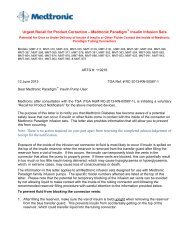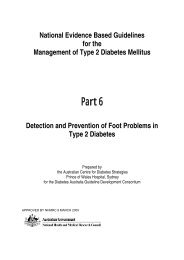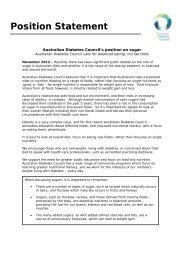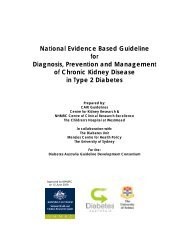Tamil - Australian Diabetes Council
Tamil - Australian Diabetes Council
Tamil - Australian Diabetes Council
- No tags were found...
Create successful ePaper yourself
Turn your PDF publications into a flip-book with our unique Google optimized e-Paper software.
Chronic complications - continued<br />
<strong>Diabetes</strong> and nerve disease:<br />
<strong>Diabetes</strong> over time can cause damage to nerves throughout the body. This damage is<br />
referred to as diabetic neuropathy.<br />
Neuropathy leads to numbness, changes in sensation and sometimes pain and weakness in<br />
the , feet, legs, hands and arms. Problems may also occur in the digestive tract, heart and sex<br />
organs.<br />
Diabetic neuropathy also appears to be more common in people who have:<br />
• Problems controlling their blood glucose levels<br />
• High levels of blood fat<br />
• High blood pressure<br />
• Excess weight<br />
• An age greater than 40<br />
• Had diabetes for a long time.<br />
Signs and symptoms of nerve damage may include:<br />
• Numbness, tingling, or pain in the toes, feet, legs, hands, arms, and fingers<br />
• Muscle wasting of the feet or hands<br />
• Indigestion, nausea, or vomiting<br />
• Diarrhoea or constipation<br />
• Feeling dizzy or faint due to a drop in blood pressure when standing<br />
• Visual problems<br />
• Problems with urination<br />
• Erectile dysfunction (impotence) or vaginal dryness<br />
• Sweating and palpitations<br />
• Weakness<br />
• Dry skin<br />
• Dry mouth, eyes, nose.<br />
Neuropathy can also cause muscle weakness and loss of reflexes, especially at the ankle,<br />
leading to changes in the way the person walks. Foot deformities may occur. Blisters and<br />
sores may appear on numb areas of the foot because pressure or injury goes unnoticed,<br />
leading to the development of an ulcer. If foot injuries or ulcers are not treated quickly, the<br />
infection may spread to the bone, and in extreme circumstances, may result in amputation.<br />
Due to neuropathy and its effect on daily living the person may lose weight and is more likely<br />
to suffer with depression.<br />
The best way to minimise your risk for developing neuropathy is to keep your blood glucose<br />
levels as close to the recommended range as possible. Daily foot care is of great importance<br />
to reduce complications.<br />
Treatment of neuropathy includes pain relief and other medications as needed, depending<br />
on the type of nerve damage. Discuss the options with your health care team.<br />
<strong>Diabetes</strong> and heart disease/stroke:<br />
People with diabetes are at increased risk of heart disease and stroke. Higher than<br />
recommended blood glucose and cholesterol levels and high blood pressure over long<br />
periods of time damage the large blood vessels. This can lead to heart disease (coronary<br />
artery disease), damage to the brain (cerebral artery disease) and other blood vessel disease<br />
(peripheral artery disease).<br />
Blood vessel disease is progressive and causes hardening and narrowing of the arteries due<br />
to a gradual build up of plaque (fatty deposits).<br />
Coronary artery disease is the most common form of heart disease. Blood carries oxygen and<br />
76
















